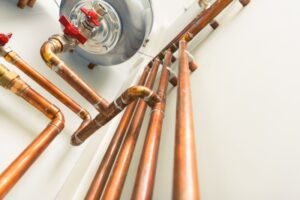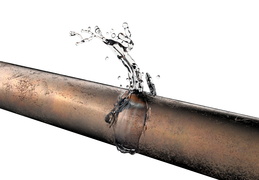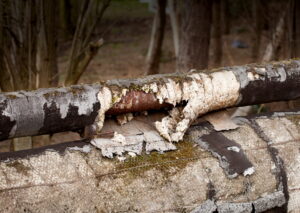Repiping a house is one of the biggest plumbing jobs you may ever need to schedule. But if it’s necessary, it’s also one of the most helpful and important jobs you can have done. Repiping can be done on a smaller scale, but in this post we’re looking at the question of the whole-house repiping, when our expert plumbers remove the outdated pipes from your home and replace them with upgraded material. This will give your whole house a new lease on life and prevent numerous potential future problems with your plumbing in Akron, OH.
So, the big question: Does your home need whole-house repiping?
Outdated Piping Material
To answer this question, you need to know a bit about the types of piping material that may be in your home, depending on its age.
For many decades, the most common metals used for plumbing (in residential and commercial buildings) were lead, cast iron, and galvanized steel. In some cases, clay pipes were used for sewer lines. Although both cast iron and galvanized steel are tough and durable metals, they have drawbacks of eventually succumbing to corrosion after about fifty years. Galvanized steel, which is steel covered with a zinc solution, can also create harmful chemicals in the water because of that zinc solution. Lead pipes are now well-known for creating drinking water hazards that can especially harm young children.
If your house was constructed before 1970, you almost certainly have some of these materials in the plumbing system—and in fact they may make up the entire plumbing system if it was built before 1950. We recommend having plumbers examine the house to check if you have outdated metals that are starting to decay and corrode.
Newer homes may also have problems with a plastic called polybutylene. This gray plastic was used throughout the 1970s and ‘80s as a cheaper substitute for copper but was banned from use in 1996 because it was encountered multiple ruptures. It was installed in over 10 million homes, so if your house was built before 1996 it may have polybutylene pipes.
The Newer Materials
If your home does need repiping, what materials will our plumbers use to make the upgrades? Copper is the metal most commonly used today for plumbing. It’s lightweight and corrosion-resistant (although not corrosion-proof; some types of corrosion still affect it). It’s also difficult for bacteria to grow inside copper pipes because copper creates a biostatic atmosphere.
Plastic pipes are used extensively in indoor plumbing for both hot and cold water lines. The two most commonly used plastic pipes are CPVC (chlorinated polyvinyl chloride) and PEX (cross-linked polyethylene). PEX is flexible and can be used in tight positions, while CPVC is highly resistant to temperature changes and safe for drinking water. Plumbers will often have different preferences for the type of plastic they use for specific jobs, but you can trust that our plumbers will always see you have the best quality new pipes.
Talk to our plumbers today if you think you may need repiping for your home. We’ll help you make the right choice for your home’s future.
Schedule your plumbing services with Crown Group Ohio. Comfort Experts since 1963.
Continue Reading
Tags: Akron, Plumbing, Repiping
Posted in Plumbing | Comments Off on Does Your House Need Repiping?




